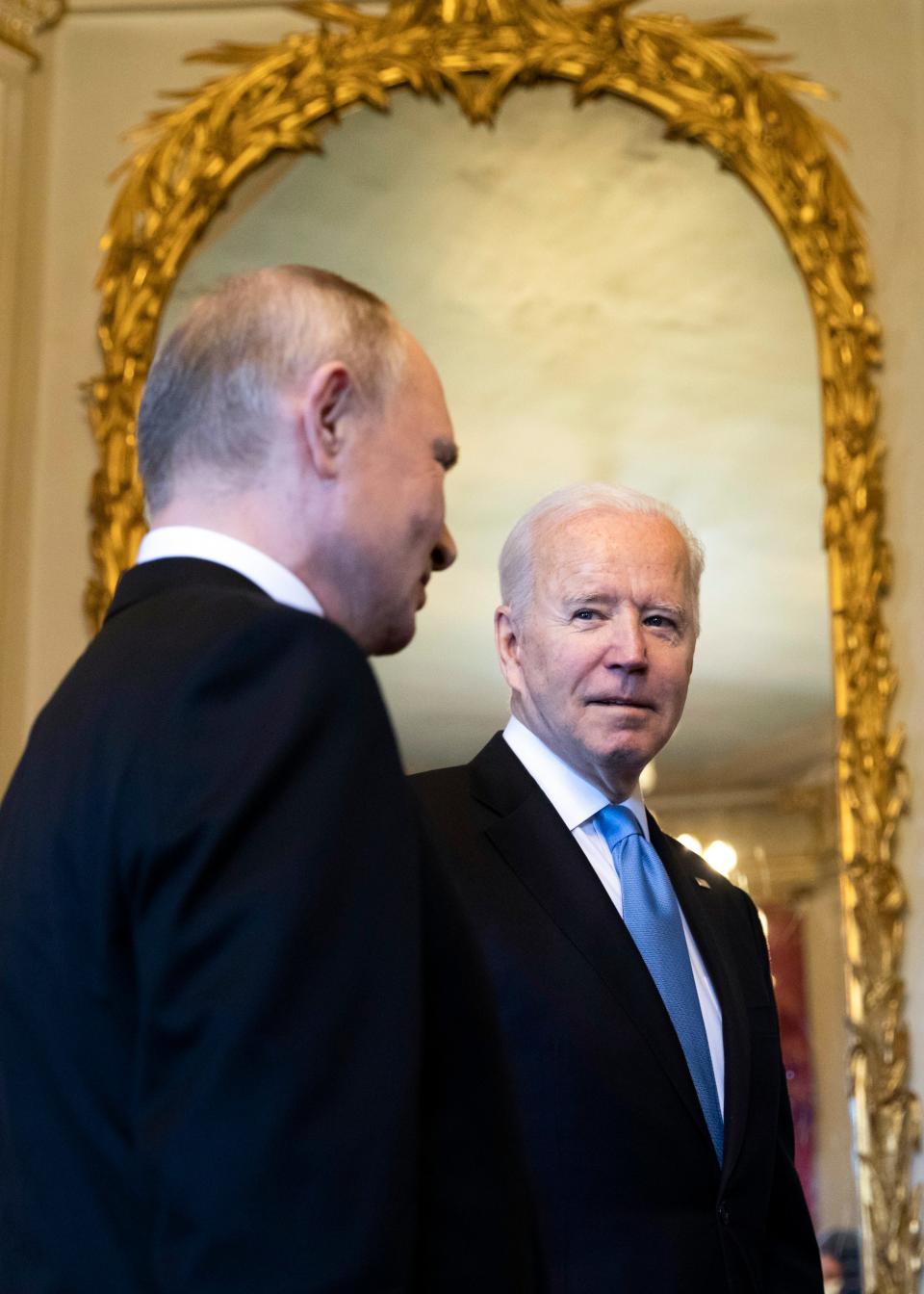‘Trump is gone,’ but lingering: As Biden vows ‘America is back,’ allies wonder for how long
President Joe Biden spent a whirlwind week in Europe renewing transatlantic vows, reinforcing his message that the world is in an existential struggle between democracies and autocracies, and reclaiming an American diplomatic centerground following four years of relative chaos and drift under his predecessor, Donald Trump.
Biden was enthusiastically welcomed by close allies – many of them old friends from his long diplomatic career – at a G-7 summit in Cornwall, England, and at a meeting with leaders at the NATO military alliance's headquarters in Brussels. He departed talks in Geneva with his Russian counterpart, Vladimir Putin, with few concrete deliverables, but with some hope there could be a path forward for better ties with Moscow amid many fault lines – cyberattacks, human rights, election meddling, Russia's actions in Ukraine.
'I did what I came to do': Biden, Putin leave summit with agreements, tension
But for all of Biden's attempts to reassure partners shaken by Trump's isolationist words and actions that "America is back," some allies have lingering doubts about the forces that produced Trump's election. They are wondering whether the U.S. can, longer term, be trusted to play its traditional role on the world stage, said Alexander Vershbow, a former U.S. ambassador to Russia and NATO deputy secretary-general.
"Our allies are quite relieved the U.S. (under Biden) is returning, as they see it, to normal. With a president who is a true believer in NATO and U.S. alliances," Vershbow said. "They are also wondering whether those forces are gone for good, or if there's a chance the U.S. could shift back to a more contentious, more transactional approach to NATO" and other foreign policy areas in 2024, after the next U.S. presidential vote.
‘There’s Trump again’: 2024 looming
To be clear, it's not certain yet whether Trump will run again for president. In interviews and statements, he's been insinuating he might. But overall, he's been coy regarding the 2024 election. Yet there's no getting away from the fact that Trump remains hugely popular within the Republican Party. More than five months after Biden's victory was certified by Congress, a recent Reuters/Ipsos poll found 25% of Americans surveyed, including 53% of Republicans, view Trump as the "true" president.
"Nobody is saying it aloud, because nobody wants it to happen," said a senior German official who works on foreign affairs in Chancellor Angela Merkel's coalition government.
"But everybody knows 2024, maybe even 2022 (when the U.S. holds midterm elections) might be the closing time for Biden to pursue his overseas agenda before there's Trump again, or another Trump-like president," the official said, who spoke on condition of anonymity to preserve sensitive German diplomatic channels with Washington.
"It's real concern. Trump is gone, but in some ways he's still there."
Handling Russia and China
For would-be NATO countries like Georgia, a tiny former Soviet nation that sits on the Black Sea sandwiched between Russia to the north and Turkey to the south, a reversion to a U.S. administration that fails to explicitly endorse a hardline against Moscow – as was the case under Trump – would be potentially worrisome.
Russia invaded Georgia in 2008, creating separatist enclaves in roughly 20% of Georgia's territory. In 2014, Moscow repeated the process in Ukraine, when it annexed Crimea.
Crimeans back Russian takeover: If they try to take it back, ‘I will fight’
David Bakradze, Georgia’s ambassador to the U.S., said he was encouraged by Biden's sojourn in Europe, his first as president, and Biden's overt backing for NATO, multilateralism and, ultimately, nations such as his who face ongoing threats from further Russian territorial aggressions.
He said that during the Trump years, "the Black Sea region felt sidelined" and that "on a daily and weekly basis, Russia is using its full bag of tricks to dominate and intimidate us" – cyberattacks, misinformation and provocations such as impeding border crossings for Georgian nationals entering Russia and vice-versa.

Bakradze was careful to add that Georgia does not take a position on internal U.S. domestic politics – it does not favor a Republican or Democrat for the U.S.'s highest office – but he said there was "strong support" for Georgia from the Biden administration "at every level" when the country was discussed at the NATO meeting in Brussels.
Still, Max Abrahms, a political scientist at Northeastern University in Boston, questioned whether Trump really "fundamentally eroded transatlantic alliances" during his time in office.
Abrahms said these alliances might have taken a "dip" under Trump, but he believes they largely remained the same because of strong backing from other members. Trump's derogatory language aimed at allies or lack of apparent interest in alliances that stretch back many years does not change that, he said.
Trump's fiercest critics: He may have gotten some world affairs right
Abrahms added that if Trump were to be elected again – "a really big if" – he foresaw Trump "very much siding with Europe against China," as Beijing increasingly outpaces Russia as the West's chief national security threat. Abrahms said Biden's multilateralist instincts may ultimately produce less full-throated China criticism from him.
Elsewhere, Biden's first overseas trip as president drew mediocre praise.
John Bolton, Trump's former national security adviser, said of Biden's meeting with Putin, perhaps the most-watched part of his eight-day overseas journey: "The White House went out of its way to set a very low bar for performance, and they succeeded."
Bolton added that he felt the meeting was "premature" and that Biden hadn't fully thought through his policy toward Russia. He said Biden seemed to be going through a "checklist" of Russian-related incidents.
"I just don’t think this accomplished very much," Bolton said.
Contributing: Deirdre Shesgreen
This article originally appeared on USA TODAY: Trump is gone but Biden Europe trip brings up allies' lingering worry

 Yahoo Movies
Yahoo Movies 
